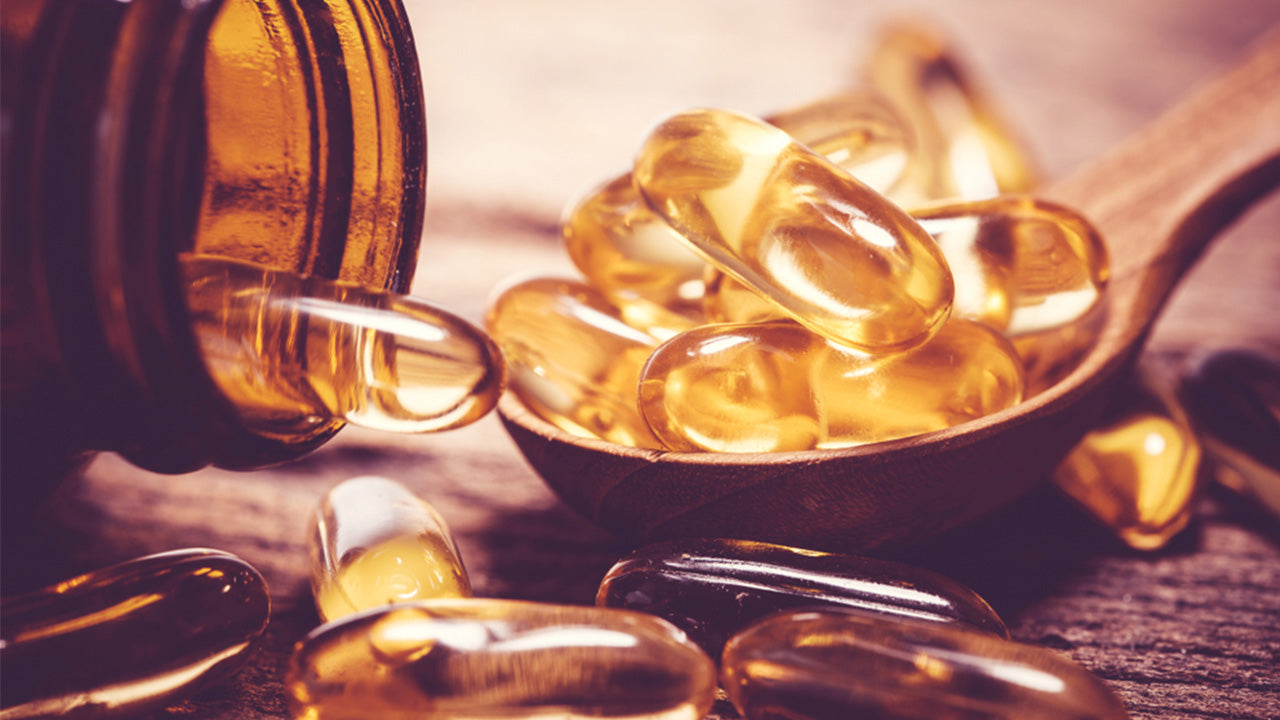The 10 Best Anti-Aging Supplements for Health and Longevity
 By: by Amino Science
By: by Amino Science

Ask just about anyone, and they'll probably tell you that they'd like to live a longer, healthier life. And if there were a magic supplement that promised to extend their lives while keeping them looking and feeling young, they'd gladly take it. Of course, no such dietary supplement exists...yet. But what if we told you that some supplements actually have shown promise in slowing the aging process? Want to learn more? Then we invite you to come with us as we explore the 10 best anti-aging supplements for slowing the signs of aging and increasing both health and longevity.
The 10 Best Anti-Aging Supplements
Whether you're interested in anti-aging benefits for your skin, body, brain, or all three, these 10 anti-aging supplements have been shown in studies to be the best at supporting the body in its fight against oxidative stress, inflammation, and other factors known to speed up the aging process.

1. Antioxidant Vitamins
Every moment we're alive, we're bombarded with free radicals. Although these atoms are natural byproducts of the biochemical reactions that take place each day inside the body, they also have unpaired electrons. Which means free radicals are constantly seeking to stabilize themselves by stealing electrons from other atoms. And this just creates more free radicals.
Without sufficient antioxidants to neutralize these rogue molecules, free radicals can eventually get out of control. And this can cause inflammation, DNA damage, and decreased cellular energy production. Over time, this oxidative stress may result in any number of degenerative diseases, including Alzheimer's disease, heart disease, arthritis, and cancer.
One of the best ways to neutralize excess free radicals and protect the body from cellular damage is to eat more fresh fruits and vegetables, which are rich in antioxidants, including vitamins A, C, and E. However, studies have found that supplementing with these essential nutrients may also have significant health benefits.
For example, a study published in the journal Archives of Ophthalmology found that individuals who supplemented with vitamins A (in the form of beta-carotene), C, and E plus zinc experienced a decreased risk of age-related macular degeneration.
And a study published in the journal BioMed Research International noted that retinol and other vitamin A derivatives are crucial for healthy vision, skin, and bones. What's more, researchers noted that adequate supplies of vitamin A are necessary for wound healing, cardiovascular health, and cancer prevention.
Like vitamin A, vitamin C is a potent antioxidant with known benefits for health. It's also been found to protect the body from exercise-induced oxidative stress.
For example, a study published in the journal Oxidative Medicine and Cellular Longevity found that supplementation with vitamin C markedly decreases exercise-associated lipid peroxidation—a destructive process in which lipids degrade in the presence of free radicals.
Vitamin C is also known to boost the immune system, assist with wound healing, and protect brain function from free radical damage.
What's more, vitamin C plays an integral part in healthy skin. In fact, healthy skin contains high concentrations of vitamin C, which is known to boost collagen production (also necessary for healthy joints) and protect against damage from UV radiation—a known risk factor in the development of skin cancer.
Unfortunately, skin concentrations of vitamin C diminish with age. However, a study published in the journal Nutrients noted that vitamin C supplementation can reverse many of the signs of skin aging by boosting collagen production—thus improving skin elasticity and the appearance of fine lines—protecting the skin from UV damage and minimizing scar formation.
Vitamin E is also a powerful antioxidant with proven health benefits. A large clinical trial published in the journal Age and Ageing found that men who smoked less than a pack of cigarettes per day and also took supplemental vitamin E—in combination with vitamin C—experienced an increase in lifespan of approximately 2 years over those in the control group.
2. Alpha-Lipoic Acid
Alpha-lipoic acid is a sulfur derivative that's produced naturally within the body's mitochondria—the energy centers of the cells.
Although alpha-lipoic acid plays an important role in metabolism and helps the body's enzymes convert nutrients into energy, it's also known to act as an antioxidant and to possess potent anti-inflammatory activity. Even though the body has the ability to produce its own alpha-lipoic acid, it creates only tiny amounts. Therefore, alpha-lipoic acid is often used as a dietary supplement.
One of the most remarkable aspects of alpha-lipoic acid is that it's both fat- and water-soluble and has the ability to regenerate other antioxidants, including vitamin C. It's also widely used in the treatment of diabetic neuropathy and multiple sclerosis.
What's more, a recent study published in the journal Biomolecules noted that alpha-lipoic acid has great potential in the treatment and prevention of age-related health conditions, including cognitive decline.
3. Coenzyme Q10
Like alpha-lipoic acid, coenzyme Q10 (CoQ10), is an antioxidant the body normally produces on its own. Although CoQ10 is required by the body's cells for normal energy production, levels decrease with age and certain health conditions, including chronic obstructive lung disease (COPD) and heart disease.
As part of its role as antioxidant, CoQ10 is also known to play an important role in skin health, helping to protect the skin from UV damage and guard against skin cancer and premature skin aging.
According to a review published in the Journal of Pharmacy & Bioallied Sciences, CoQ10 may also be useful in the treatment and prevention of numerous age-related diseases, including heart disease, cancer, and Parkinson's disease.
Another review published in the journal Frontiers in Physiology noted similar findings and concluded that CoQ10 improves energy production, provides antioxidant protection for the body's tissues and organs, and reduces symptoms commonly associated with aging.
4. Nicotinamide Riboside
One of the hottest new trends in anti-aging supplements is nicotinamide riboside, a form of niacin, or vitamin B3. Nicotinamide riboside is converted in the body into the coenzyme nicotinamide adenine dinucleotide (NAD+), which repairs damaged DNA and helps convert nutrients into energy and regulate cellular processes.
However, like both alpha-lipoic acid and CoQ10, levels of NAD+ decline with age. Yet NAD+ is so important to normal bodily processes that studies have linked the decline of this coenzyme to a number of age-related conditions, including metabolic disorders and cognitive decline.
One of the reasons for this is thought to be related to the role NAD+ plays in the activity of specialized proteins called sirtuins. These proteins are known to play a crucial part in regulating the aging process. They're also linked to the health benefits seen with a calorie-restricted diet. However, sirtuins can't function properly without sufficient levels of NAD+.
Researchers behind a study published in the journal F1000 Research even went so far as to state that decreases in NAD+ are "one of the fundamental molecular events that regulate the process of aging" and, potentially, lifespan.
5. Green Tea
When it comes to antioxidants, few things can rival the power of green tea. In fact, it's jam-packed with so many powerful antioxidants that many scientists say it's the healthiest thing you can drink.
Green tea is best known for a group of polyphenols called catechins. These powerful plant chemicals act as antioxidants and are also known to possess significant anti-inflammatory activity.
Green tea has also been found in studies to lower blood sugar, cholesterol, and blood pressure and to protect the brain from the accumulation of plaques associated with the development of Alzheimer's disease.
In addition, a large study published in JAMA found that consumption of green tea was inversely associated with all causes of death—especially stroke—in Japanese adults 40 to 79 years of age.
6. Pterostilbene
If you keep up with the latest trends in antioxidants, you're no doubt familiar with resveratrol—a polyphenol found in blueberries, peanuts, pistachios, Japanese knotweed, and red wine.
Resveratrol first became popular in the mid-2000s, when it was touted by marketers as an anti-aging wonder molecule after it was found in studies to extend the lifespans of certain non-mammalian species. But scientists were more cautious, especially in light of resveratrol's poor bioavailability.
Still, a review published in the journal PLoS One concluded that, while there wasn't enough evidence to support regular supplementation with resveratrol, animal studies were promising with regard to its potential role in improving heart health and preventing cancer and diabetes.
And a review published in the journal Biomedicines concluded that resveratrol is a powerful antioxidant with anti-inflammatory, anticarcinogenic, cardioprotective, antiviral, and neuroprotective properties, and that derivatives of resveratrol are among the most promising anti-inflammatories.
What's more, it's widely recognized that, like NAD+, resveratrol helps activate sirtuins. Yet the problems of poor bioavailability remain.
Enter pterostilbene.
It may sound like the latest dinosaur discovery, but pterostilbene is closely related to resveratrol and has been found to possess many of the same properties.
However, the structure of pterostilbene is different enough that it's been shown to be 4 times as bioavailable as resveratrol, with a half-life that's over 7 times greater—which means that pterostilbene is more easily taken up by the body's cells and remains active longer.
It's important to point out that, compared with resveratrol, the research into pterostilbene is still in its infancy. But there's already good reason to believe that its increased bioavailability and greater half-time may make pterostilbene the new resveratrol.
7. Omega-3 Fatty Acids
If you've been hearing a lot about omega-3 fatty acids lately, it's for good reason. These essential nutrients are required for healthy cell membranes, hormone production, and blood clotting. They also help the body absorb vitamin D and regulate which genes are turned on and which are turned off.
What's more, omega-3 fatty acids are known to act as both antioxidants and anti-inflammatories and have even been shown in numerous studies to assist in the prevention of many chronic diseases, including heart disease, diabetes, and cancer.
In addition, a review published in the journal Nutrients noted that supplementing with or eating more foods rich in these important fats, including fish, flaxseeds, and leafy greens, may help stave off cognitive decline as we age.
8. Probiotics
Many people don't realize it, but probiotics may very well be the foundation of good health. After all, without a healthy balance of gut flora, immune system health and even mood suffer.
What's more, studies have found that imbalances in gut bacteria are linked to increases in age-related immune system decline and inflammatory diseases, and that taking a high-quality probiotic supplement may help stave off these health problems.
In addition, a review published in the journal BioMed Research International found that a combination of supplemental probiotics and a diet rich in phytoestrogenic polyphenols (found in foods like soy products and flaxseeds) may work together to reduce many of the conditions commonly associated with aging, including cancer.
9. Turmeric
We all know turmeric as the yellow-orange spice that gives curry its distinctive color. However, thanks to a compound called curcumin, it's also one of the most powerful antioxidants and anti-inflammatories.
One of the reasons turmeric is considered such a potent antioxidant is that it not only acts as an antioxidant, but it also stimulates the production of glutathione, the body's master antioxidant.
The powerful properties of turmeric have made it a subject of multiple studies, which have found it to have benefits for arthritis, diabetes, heart disease, cancer, Alzheimer's disease, and even inflammatory bowel disease.
In addition, a review published in the International Journal of Molecular Sciences found that turmeric supports a healthy gut microbiome, helps regulate autophagy, and may even extend lifespan.
10. Amino Acids
We're all aware that advancing age brings with it wrinkles and gray hair. And we all know that, as we age, we lose muscle mass and it becomes more difficult to exercise as long and as hard as we did when we were young. These are some of the main reasons anti-aging supplements are such big business!
But did you know that all of these processes are intricately linked to amino acids?
You see, amino acids are the building blocks of protein, and protein is essential for the proper functioning of almost every biological process. But as we age, it becomes more difficult to build new protein.
This anabolic resistance has widespread implications for health. Because as we lose muscle mass, we become more susceptible to disease. And that means our risk of heart disease, kidney disease, liver disease, osteoarthritis, cancer, type 2 diabetes, cognitive decline—you name it—increases.
But by eating a healthy diet and taking a balanced formula of essential amino acids—the amino acids the body can't make on its own and must obtain from food or supplements—you give your body the building blocks it requires to overcome age-related anabolic resistance and create the proteins it must have to keep the body's muscles strong and tissues and organs healthy. We recommend Amino Co's Active Aging formula called Life.
Final Thoughts...
Let's face it, Silicon Valley optimism aside, we may never find the secret to turning the clock back for good. But with proper diet and exercise and the strategic use of anti-aging supplements, science has shown us that it's entirely within our grasp to look younger, stay more active, and remain healthier far longer than ever before. And that may add not only quantity but also, and perhaps more importantly, quality to all the years of our lives.

Up to 25% off Amino
Shop NowTAGS: supplements
Join the Community
Comments (0)
Most Craveable Recipes




 833-264-6620
833-264-6620



















